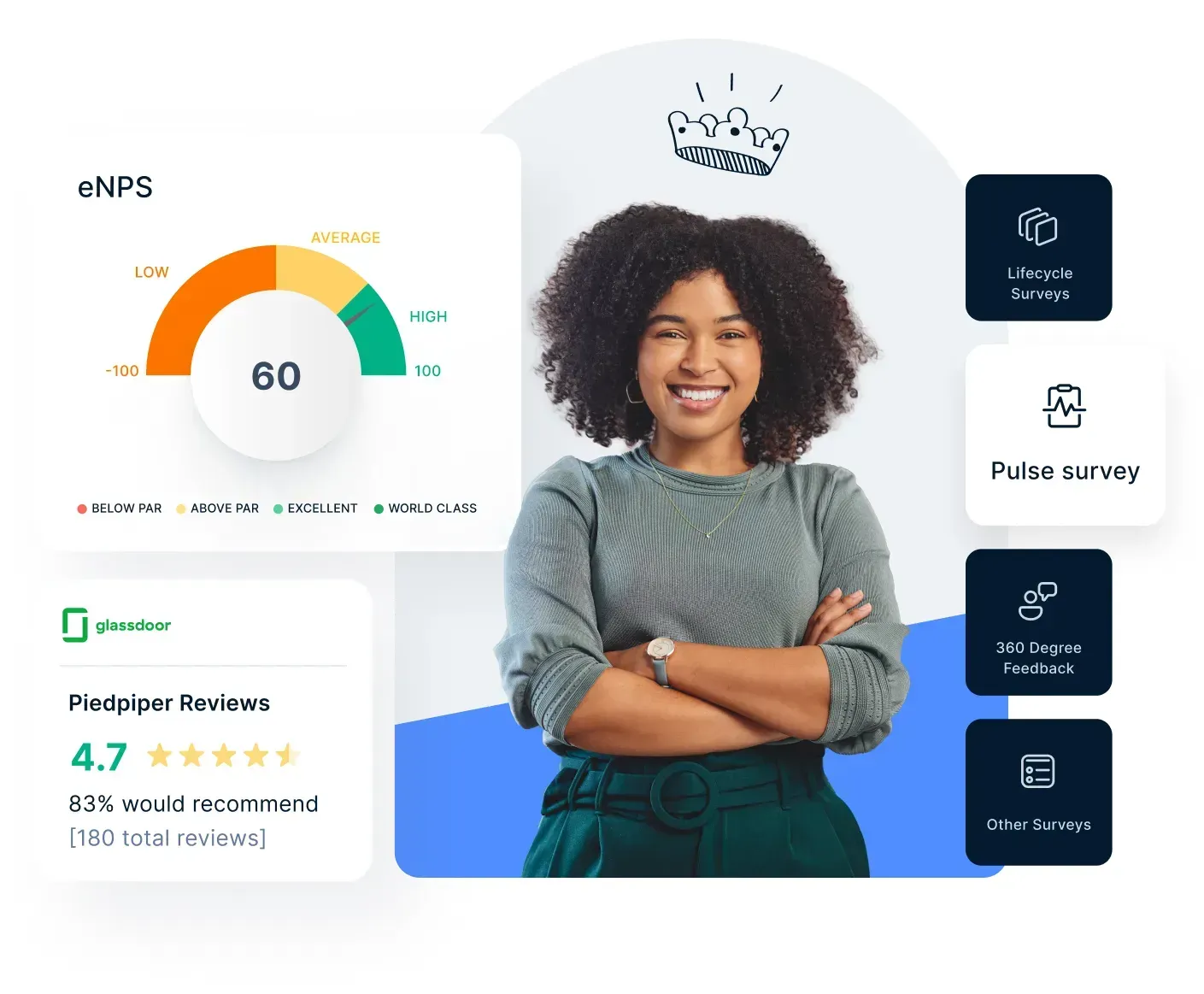30 Employee Feedback Survey Questions to Improve Workplace Engagement
A well-structured employee feedback survey helps organizations understand employee experience, engagement, and growth opportunities. This guide covers feedback questions to ask employees, including anonymous employee feedback questions and employee feedback questions for manager.
On this page
Creating a workplace where employees feel valued, heard, and supported is essential for long-term success. A positive work environment not only boosts morale but also enhances productivity and retention. However, understanding what employees truly need requires more than assumptions—it demands direct input from them.
This is where employee feedback questions become crucial. By regularly gathering feedback, businesses can identify areas for improvement, strengthen leadership effectiveness, and foster a culture of continuous growth. A well-structured survey helps uncover insights about engagement, job satisfaction, and overall workplace culture, making it a powerful tool for organizational success.
To help you get started, we have compiled 20 essential employee feedback survey questions covering key areas like work environment, management effectiveness, career growth, and job satisfaction. These feedback questions for employees will provide actionable insights that drive meaningful improvements, helping you build a more positive, productive, and engaged workforce.
What is an employee feedback survey?
A tool utilised by business owners, executives, and HR specialists is an employee feedback survey. These questionnaires inquire about a employees career progress, work environment, and job happiness. The corporate culture, employee experience, and retention are then improved using the information.
Benefits of employee feedback survey
Early and frequent employee feedback surveys have several advantages. The following are some advantages of employee feedback surveys:
- Increasing employee satisfaction and engagement
- Improved control of internal communication
- Improved comprehension of workers' professional aspirations
- The capacity to offer constructive criticism for career growth
- Identifying and removing obstacles for workers with impairments, neurodivergent disorders, or other long-term health issues
- Measuring contentment with compensation or perks offered
- Keeping track of shifts in employee attitude
- Examining previous demographic patterns, such as gender equality, ethnic variety, and age distribution within your business
20 Employee feedback questions for managers and employers to include in their surveys
You may get a sense of the daily working environment at your company from the employee feedback survey questions you ask. Although it's crucial to measure productivity, you shouldn't broach the subject of employee performance. Employee feedback surveys provide your team the chance to share good and bad news with you.
If used appropriately, this information may even show you how to boost your revenue. Team productivity is directly impacted by feelings of belonging, connection, and other aspects of workplace culture. Use the following survey questions for employee feedback as a starting point for your survey design:
Employee feedback survey questions about experience
Understanding employee experience is key to improving job satisfaction and retention. These survey questions for employee feedback help assess workload, team dynamics, and overall job fulfillment. By including the best employee feedback questions, organizations can identify areas for growth and enhance the employee journey.
1. Do you feel a connection with your coworkers?
2. Do you feel at ease asking questions to your manager?
3. Would you suggest a friend or relative for an open position at this company?
4. How satisfied are you with your job, on a scale of 1 to 10?
5. Do you think your company's leadership can be trusted?
Employee feedback survey questions about personal development
Growth opportunities play a crucial role in employee motivation and retention. These feedback questions to ask employees focus on career progression, skill development, and learning resources. By gathering insights, businesses can refine training programs and support employees in achieving their goals.
6. Do you discuss your career with your manager? If yes, h ow frequently?
7. Do you think your team has a clear route for advancement and development?
8. Do you know who to contact at work if you need support?
9. Do you have access to resources for advancing your career?
10. Have you recently had your performance evaluated?
Employee feedback survey questions about work environment
A positive work environment directly impacts productivity and morale. These questions to ask for employee feedback evaluate factors like workplace culture, collaboration, and physical workspace. Addressing these concerns helps organizations create a more engaging and inclusive atmosphere.
11. Do you work in a comfortable atmosphere?
12. Do you believe you have all the tools and equipment you need to carry out your daily tasks?
13. Is your working environment distraction-free and supportive of concentration?
14. Do you have the freedom to work when and where it will be most productive for you?
15. Do you feel encouraged to adopt flexible work schedules?
Employee feedback survey questions about engagement
Employee engagement drives performance and long-term commitment. These survey questions for employee feedback assess motivation levels, recognition, and alignment with company values. Insights from these surveys enable businesses to implement strategies that boost engagement and job satisfaction.
16. Do your close coworkers appear to take pride in their work?
17. Do the company's ideals appear to be being reflected in organisational changes?
18. Do you look forward going to work every day?
19. Within the recent three months, have you applied for or attended an interview at another company?
20. What would be the reason if you were to leave this firm tomorrow?
Anonymous employee feedback questions
Encouraging honest input is easier with anonymous employee feedback questions. These questions help uncover workplace challenges, leadership concerns, and areas for improvement without fear of judgment. Anonymity fosters transparency, leading to more actionable feedback.
21. How valued do you feel at work?
22. Do you feel comfortable sharing your opinions and concerns with your manager? Why or why not?
23. What is one thing leadership could do to improve your overall work experience?
24. How often do you receive constructive feedback that helps you grow in your role?
25. On a scale of 1-10, how likely are you to recommend this company as a great place to work? Why?
Employee feedback questions about manager behavior
Managers play a critical role in employee success. These employee feedback questions for managers assess leadership effectiveness, communication, and support. Honest responses help managers refine their approach and create a more positive team dynamic.
26. How effectively does your manager communicate expectations and goals?
27. Does your manager provide constructive feedback that helps you improve?
28. How approachable is your manager when you have concerns or need support?
29. Does your manager recognize and appreciate your contributions?
30. What is one thing your manager could do to better support you in your role?

Get Your Free Employee Feedback Survey Template
Start collecting meaningful insights with our customizable survey template. Download now to enhance employee satisfaction and drive workplace improvements!
How to create an employee feedback survey
Creating an effective employee feedback survey requires careful planning and execution. A well-structured survey helps identify workplace strengths, uncover challenges, and guide meaningful improvements. Follow these steps to design a survey that delivers actionable insights:
1. Define clear objectives
Before crafting your employee feedback questions, determine what you want to achieve. Are you assessing employee engagement, leadership effectiveness, job satisfaction, or team collaboration? Clear objectives help ensure that your survey stays focused and relevant.
- Example goal: Measure employee satisfaction with remote work policies.
- Example goal: Understand the impact of recent leadership changes on team morale.
2. Craft the right questions
The success of your survey depends on the quality of your feedback questions for employees. Use a combination of:
- Likert scale questions: "On a scale of 1-5, how satisfied are you with the communication from leadership?"
- Multiple-choice questions: "Which factor most affects your job satisfaction? (a) Workload, (b) Management, (c) Career Growth, (d) Compensation"
- Open-ended questions: "What is one thing we can do to improve your work experience?"
Avoid vague or leading questions. Keep them short, clear, and easy to understand to encourage honest responses.
3. Use a reliable survey platform
A manual approach can lead to low response rates and difficulty analyzing results. Empuls offers an intuitive platform for creating surveys, distributing them efficiently, and analyzing responses in real time.
Key benefits of Empuls:
- Pre-built templates for various survey types (engagement, well-being, leadership effectiveness)
- AI-driven insights to identify workplace trends
- Automated reminders to improve response rates
- Anonymity features to encourage honest feedback
4. Ensure confidentiality and transparency
For employees to provide candid responses, they must feel safe. Keep surveys anonymous and communicate how feedback will be used. Share past survey results and highlight changes made based on feedback to build trust.
- Best practice: If using Empuls, enable anonymous mode to encourage honest participation.
5. Analyze and take action
Collecting feedback is just the beginning. Review survey results, identify recurring themes, and create an action plan.
- Segment responses: Break down results by department, tenure, or role for deeper insights.
- Prioritize key issues: Focus on patterns rather than isolated complaints.
- Close the feedback loop: Share insights with employees and outline specific steps for improvement.
For continuous improvement, surveys should be part of an ongoing feedback strategy rather than a one-time initiative. Platforms like Empuls streamline this process, making it easier to track trends and measure progress over time.
By following these steps, organizations can create meaningful employee feedback surveys that drive engagement, improve workplace culture, and enhance employee satisfaction.
Following up after an employee feedback survey
It's time to analyze the findings of your employee feedback survey after you've completed it and gathered the data. If you've never undertaken this kind of survey, it can be beneficial to get in touch with an analyst or HR specialist who can assist you examine the results.
Remember your staff, who are the most crucial stakeholders, when you evaluate the data. Inform them of what you've discovered about your workplace's culture as a consequence of their comments. Thank them for participating and for their time. Without them, your team would pass up valuable input and opportunities for growth. This might mean future success or tragedy for your company.
Make a genuine commitment to dealing with any areas of worry, even if you are unsure of what to do just now. Don't be scared to apologize if the feedback shows a discrepancy between business ideals and employee experience. Make sure you follow up with specific steps (within a month or less). The amount of involvement in the next surveys will be influenced by how you manage comments today.
Elevate your employee feedback surveys with Empuls

Gathering employee feedback is only effective when insights lead to meaningful action. Empuls streamlines this process with automated surveys, real-time analytics, and intuitive dashboards, helping organizations move beyond just collecting responses to driving engagement.
Why choose empuls for employee surveys?
✔ Comprehensive survey options – Conduct eNPS, pulse surveys, lifecycle surveys, and engagement surveys effortlessly.
✔ Real-time analytics & insights – Identify workplace trends and take data-driven action.
✔ Customizable & automated surveys – Tailor questions to suit your workforce and schedule automated feedback cycles.
✔ Seamless accessibility – Empower employees to share feedback via desktop or mobile, ensuring higher participation.
With Empuls, organizations can create a culture of continuous feedback, ensuring employees feel heard and valued while enabling leadership to make informed, strategic decisions.
Book a Demo to transform your employee feedback process today!
Key takeaways
Surveys of employee opinions are a great approach to learning how people feel about their workplaces. The data obtained can assist leaders in identifying the necessary adjustments. They aid in gauging employee satisfaction, well-being, and attitude toward their company. Your team may interact directly with leadership through a semi-annual or yearly survey, which fosters team trust.
Surveys asking for employee input shouldn't happen only once. Regular employee surveys enable businesses to respond more quickly to problems identified in prior surveys. Additionally, they will be able to observe trends over time. Teams of all sizes, but notably those in bigger businesses, value this data greatly. The more quickly you expand, the more difficult it may be to preserve business culture.


















